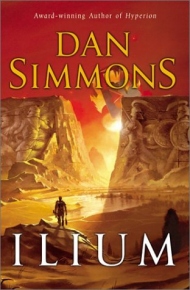This article needs additional citations for verification .(September 2007) |
 Cover to the 2003 first edition | |
| Author | Dan Simmons |
|---|---|
| Cover artist | Gary Ruddell |
| Language | English |
| Series | Ilium/Olympos |
| Genre | Science fiction |
| Publisher | HarperCollins, Eos imprint |
Publication date | 2003 |
| Publication place | United States |
| Media type | Print (hardback & paperback) |
| Pages | 731 (paperback edition) |
| ISBN | 0-380-97893-8 |
| Followed by | Olympos |
Ilium is a science fiction novel by American writer Dan Simmons, the first part of the Ilium/Olympos cycle, concerning the re-creation of the events in the Iliad on an alternate Earth and Mars. These events are set in motion by beings who have taken on the roles of the Greek gods. Like Simmons's earlier series, the Hyperion Cantos, the novel is a form of "literary science fiction" that relies heavily on intertextuality, in this case with Homer and Shakespeare, as well as periodic references to Marcel Proust's À la recherche du temps perdu (or In Search of Lost Time) and Vladimir Nabokov's novel Ada or Ardor: A Family Chronicle . In July 2004, Ilium received a Locus Award for Best Science Fiction Novel of 2004. [1]